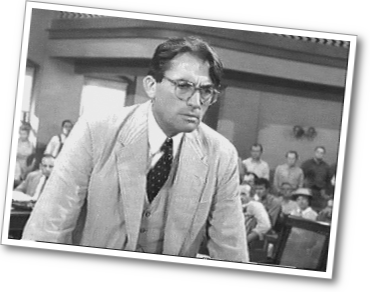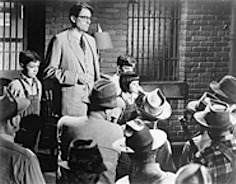
Since my last post, I’ve been underlining every other line in Edwin Friedman’s The Failure of Nerve. I’ve read a lot of books about leadership–most are about the techniques of leadership (vision-casting, team-building, communication skills) or the character of leadership (integrity, trustworthiness, servant-like, loving).
Friedman’s book, however, has the ability to completely reshape one’s perspective about leadership. It goes to the very nature of leadership and how it works.
When I wasn’t reading Friedman, I was listening to Sissy Spacek’s reading of Harper Lee’s To Kill a Mockingbird. Atticus Finch, the lawyer in this Pulitzer Prize winning novel, kept reminding me of Friedman’s description of the “well-differentiated leader.”
If you don’t remember the novel, Atticus Finch is a lawyer in Maycomb, Alabama in 1932. He puts himself and his children at risk by defending a black man accused of raping a white woman in Alabama. Atticus Finch sets a standard of morality that no other character in the book comes close to matching. His “self-differentiation” from the rest of the people of Maycomb gives him the ability to cope with the unreasonable and highly emotional elements of the town. Taking a stand against the injustice of racism, he serves as an “immune system” resisting the invasive and destructive viruses infecting the community.
For Friedman, a true leader (like Atticus Finch) resists the “chronic anxiety” around him or her. By his or her presence, the self-differentiated leader possesses a modifying, non-anxious, and often challenging presence. The crucial issue of leadership, Friedman argues, may not be how much power leaders exercise but how well their presence has been able to preserve that society’s integrity. By the integrity and audacity of their own self-possession, they keep societies (institutions, churches, movements) from “dis-integ-rating.”
Unfortunately, Friedman argues, most leaders lack nerve, becoming co-opted by the highly reactive, often regressive atmosphere of chronically anxious, dysfunctional societies. He defines chronically anxious societies as:
Reactive–the vicious cycle of intense emotional reactions of each member to events and to one another
Herders–a process thru which the forces for togetherness triumph over the forces for individuality and move everyone to adapt to the least mature members
Blame displacers–an emotional state in which members focus on forces that have victimized them rather than taking responsibility for their own being and destiny
Quick-fixers–members have a low-threshold for pain and thus constantly seek symptom relief rather than fundamental change.
Lacking well-differentiated leaders–a failure of nerve in leaders that both stems from and contributes to the first four characteristics.
 Maycomb, Alabama in 1932 was one of those chronically anxious Southern towns trying to emerge from the racism of its past.
Maycomb, Alabama in 1932 was one of those chronically anxious Southern towns trying to emerge from the racism of its past.
In Friedman’s terms, no one but Atticus Finch has the capacity to separate himself from the surrounding emotional processes. No one else has the courage to be clear about his or her principles and vision. Only Atticus is willing to be exposed and to be vulnerable, is able to persist in the face of inertial resistance and able to regulate his emotions in the face of reactive sabotage. Atticus represents a kind of non-anxious, well-principled presence that is at the heart of true leadership.
According to Friedman, such “self-differentiation” in leadership is the key to the kingdom.
Here’s a couple quotes from the book that illustrate Atticus’ well-defined self:
Atticus to his son, Jem:
I wanted you to see what real courage is, instead of getting the idea that courage is a man with a gun in his hand. It’s when you know you’re licked before you begin but you begin anyway and you see it through no matter what. You rarely win, but sometimes you do.
An exchange between Atticus and his daughter, Scout:
“This case, Tom Robinson’s case, is something that goes to the essence of a man’s conscience — Scout, I couldn’t go to church and worship God if I didn’t try to help that man.”
“Atticus, you must be wrong . . . “
“How’s that?”
“Well, most folks seem to think they’re right and you’re wrong . . . “
“They’re certainly entitled to think that, and they’re entitled to full respect for their opinions,” said Atticus, “but before I can live with other folks I’ve got to live with myself. The one thing that doesn’t abide by majority rule is a person’s conscience.”
In another exchange with Scout:
“There are some things that you’re not old enough to understand just yet. There’s been some high talk around town to the effect that I shouldn’t do much about defending this man.”
“If you shouldn’t be defending him, then why are you doing it?”
“For a number of reasons. The main one is that if I didn’t, I couldn’t hold my head up in town. I couldn’t even tell you or Jem not to do somethin’ again.”
Miss Maude Atkinson about Atticus:
“What I meant was, if Atticus Finch drank until he was drunk he wouldn’t be as hard as some men are at their best. There are just some kind of men who-who’re so busy worrying about the next world they’ve never learned to live in this one, and you can look down the street and see the results.”
‘Whether Maycomb knows it or not, we’re paying the highest tribute we can pay a man. We trust him to do right. It’s that simple.’
Bob Ewell (the antagonist) to Atticus Finch:
“What kinda man are you?”
Leave a Reply